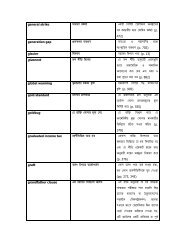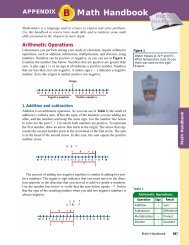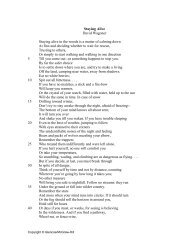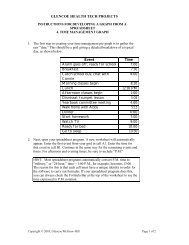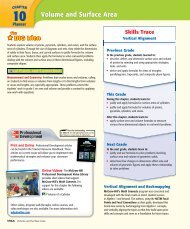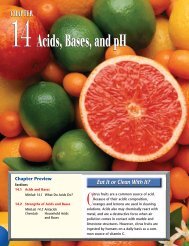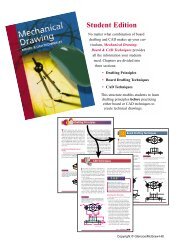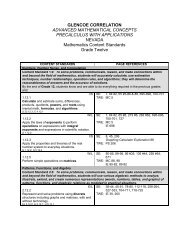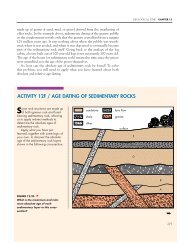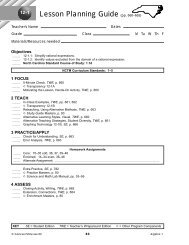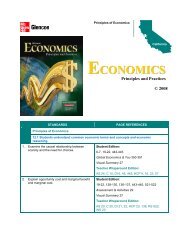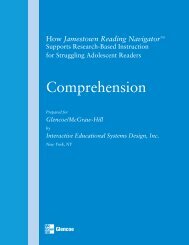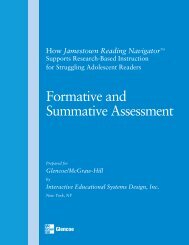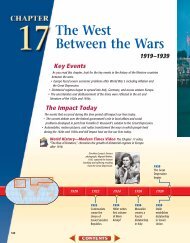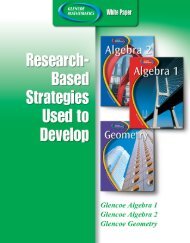Vocabulary - Research
Vocabulary - Research
Vocabulary - Research
You also want an ePaper? Increase the reach of your titles
YUMPU automatically turns print PDFs into web optimized ePapers that Google loves.
ANALYSIS AND<br />
RESULTS<br />
J a m e s t o w n R e a d i n g N a v i g a t o r<br />
Summary of <strong>Vocabulary</strong><br />
Recommendations<br />
Students should be exposed to<br />
vocabulary words multiple times,<br />
from multiple sources.<br />
<strong>Vocabulary</strong> learning should extend<br />
beyond the classroom.<br />
Application Through<br />
Jamestown Reading Navigator<br />
In Jamestown Reading Navigator Treks 2–4, students typically encounter<br />
targeted vocabulary words up to 15 times or more. Exposures to targeted<br />
vocabulary words include:<br />
• The initial vocabulary word list<br />
• The vocabulary word cards, which are accessible when vocabulary is initially<br />
taught, later in the journey (e.g., as students are reading the text<br />
selection), and elsewhere in the program as well<br />
• The Quick Match activity, which requires students to match the words<br />
with definitions, synonyms, antonyms, or characteristics of the words<br />
• At least twice in a reading selection, where the words are hyperlinked to<br />
the personalized word cards<br />
• Revisiting the word cards as a review activity, with a new yes/no question<br />
to which students respond<br />
• The Journey Test<br />
• The Look Back at <strong>Vocabulary</strong> review activity, for students who do not do<br />
well in the Journey Test. This activity includes animation about each word<br />
and a quick quiz of vocabulary words.<br />
• The journey writing assignment, which requires students to use at least<br />
two vocabulary words. The vocabulary word list is accessible during each<br />
step in the writing process.<br />
• The quest writing assignment, which requires students to use at least three<br />
vocabulary words from the journey text selections they read during the<br />
quest. The vocabulary word list is accessible during each step in the writing<br />
process.<br />
• Fluency passages for listening and oral reading that contain some of the<br />
vocabulary words<br />
• The Quest Test, which assesses some of the words<br />
In addition:<br />
• Many vocabulary words also reappear in subsequent text selections.<br />
• The Teacher Resource Guide section on Improving <strong>Vocabulary</strong> includes a<br />
variety of strategies and suggested activities for increasing the number and<br />
range of student encounters with words.<br />
• Additional vocabulary activities are suggested in the lesson plan vocabulary<br />
activity for each journey.<br />
• The Enriching <strong>Vocabulary</strong> section of the Teacher Resource Guide includes<br />
several recommendations that can help teachers extend vocabulary learning<br />
outside the classroom. Examples include:<br />
−<br />
−<br />
“Designate a bulletin board for political cartoons, comic strips, quotes,<br />
or words cut from magazines or newspapers related to new vocabulary.”<br />
This can serve as a starting point for students to collect instances<br />
of vocabulary word usages from outside the classroom.<br />
Provide “experiences that enhance the meaning of words, such as class<br />
discussions or field trips.”<br />
• The on-site professional development session <strong>Vocabulary</strong> Strategies That<br />
Motivate provides teachers with suggestions for encouraging students to<br />
extend their learning of new words outside the classroom.<br />
16<br />
Continued 2



